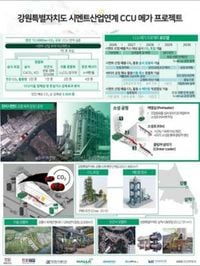Jeonbuk Province is gearing up for a transformative leap in the hydrogen industry with its recent selection for a significant public project aimed at enhancing Carbon Capture and Utilization (CCU) technologies. Announced on April 28, 2025, by the Ministry of Science and ICT, the project will establish an e-Fuel production base in the Gunsan National Industrial Complex. This initiative not only underscores Jeonbuk's commitment to carbon neutrality but also positions the province as a key player in the burgeoning hydrogen economy.
E-Fuel, a next-generation eco-friendly fuel, is produced by combining hydrogen derived from water electrolysis with captured carbon dioxide. As the world shifts towards sustainable energy solutions, this innovative fuel is emerging as a crucial component in sectors such as aviation, maritime, and national defense—areas where transitioning to electric vehicles poses significant challenges. The project's total investment is projected at 240 billion won, with 18.6 billion won sourced from the national treasury.
The production technology base being developed in Gunsan aims to generate synthetic crude oil characterized by high energy density. This will be achieved by utilizing hydrogen produced from renewable energy sources alongside carbon dioxide captured from local industrial operations. Following the production phase, the synthetic crude oil is expected to undergo refining processes to yield sustainable aviation fuel (SAF), e-diesel, and e-gasoline.
The project is slated for a duration of approximately three years and nine months, commencing in April 2025 and concluding in December 2028. The Korea Institute of Energy Technology will oversee the initiative, collaborating with eight other institutions, including the Korea Research Institute of Chemical Technology and Procon Engineering, among others.
Shin Won-sik, head of the Future Convergence Industry Bureau of Jeonbuk Province, emphasized the significance of this project, stating, "This project selection ensures Jeonbuk's technology and hydrogen industry base in preparation for the future carbon neutrality era, and aims to foster new national strategic industries centered on the e-Fuel sector." This sentiment reflects the broader ambitions of Jeonbuk to not only advance its technological capabilities but also to secure a competitive edge in the next-generation hydrogen market.
In addition to Jeonbuk's advancements, the Gangwon Special Self-Governing Province, under Governor Kim Jin-tae, has also announced a major initiative aimed at achieving the national greenhouse gas reduction target (NDC) and fostering new industries through the Carbon Capture Utilization (CCU) Mega Project. This project aims to reduce emissions by at least 35% by 2030 compared to 2018 levels.
The CCU Mega Project will focus on five major industries responsible for significant carbon emissions, including power generation, steel, petrochemicals, cement, and refining. Approximately 1 trillion 139.2 billion won will be invested in large-scale research and development demonstrations, covering the entire lifecycle from carbon dioxide capture to its utilization and final productization.
Gangwon Province is particularly focused on the cement sector, which accounts for 51% of its carbon dioxide emissions. The province plans to invest around 190 billion won in collaboration with local municipalities and companies such as Hanra Cement and EcoPro HN. The project aims to convert captured carbon dioxide into valuable products like e-methane and lithium carbonate for batteries, thereby accelerating the environmentally friendly transformation of the cement industry.
As part of its commitment to carbon neutrality, Gangwon Province is also working on establishing a CCUS cooperation cluster to create a new industrial base. The preliminary feasibility study for the CCU Mega Project is currently underway, with final results expected in October 2025. Following this, Gangwon plans to initiate full-scale project implementation starting in 2026.
In light of these developments, both Jeonbuk and Gangwon provinces are making significant strides towards a sustainable future. The integration of CCU technologies not only represents a commitment to reducing greenhouse gas emissions but also showcases the provinces' dedication to innovation and economic growth in the green sector. As these projects unfold, they are likely to serve as models for other regions aiming to achieve similar sustainability goals.
With the global focus shifting toward reducing carbon footprints and enhancing energy efficiency, the advancements in CCU technologies in South Korea highlight the country's proactive approach to climate change. The successful implementation of these projects could pave the way for new job opportunities, technological advancements, and a more sustainable industrial landscape.
As the world grapples with the pressing issue of climate change, initiatives like those in Jeonbuk and Gangwon provinces may provide crucial insights and frameworks for other regions to follow. The future of energy production and consumption is undoubtedly intertwined with the successful deployment of innovative technologies like e-Fuel and carbon capture, making these projects not only timely but essential for a sustainable future.

